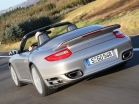technical characteristics Porsche 911 Turbo S Cabriolet since 2009
Technical characteristics of Porsche 911 Turbo S Cabriolet 2009, 2010, 2012, 2012, 2013: Power, fuel consumption per 100 km, weight (mass), road clearance (clearance), radius of reversal, type of transmission and brakes, body size and tires
Engine characteristics
| Modifications |
Engine volume, cm3 |
Power, kW (lp)/about |
Cylinders |
Twisting, Nm/(rpm) |
Type of the fuel system |
Type of fuel |
| 3.8 pdk |
3800 |
(530)/6250-6750 |
Opposite - 6 |
(700)/2100-4250 |
Direct injection |
Petrol |
Drive and transmission
| Modifications |
type of drive |
Type of transmission (basic) |
Type of transmission (optionally) |
| 3.8 pdk |
4x4 (all -wheel drive) |
Automatic with two clutches - 7 |
|
Suspension type and turning radius
| Modifications |
Front suspension |
Rear suspension |
The diameter of the turn, m |
| 3.8 pdk |
Independent - Mcpherson |
Independent - multi -link |
12.2 |
Brake system and steering wheel amplifier
| Modifications |
Type of front brakes |
Type of rear brakes |
Power steering |
| 3.8 pdk |
Disk ceramic |
Disk ceramic |
Hydraulic |
The size of the tires
| Modifications |
The size |
| 3.8 pdk |
Front wheels: 235/35 R19, rear wheels: 305/30 R19 |
Dimensions
| Modifications |
Length, mm |
Width, mm |
Height, mm |
The track front/back, mm |
Wheel base, mm |
Road clearance (clearance), mm |
Trunk volume, l |
| 3.8 pdk |
4450 |
1852 |
1300 |
1548/1494 |
2350 |
113 |
105/- |
Car weight
| Modifications |
Equipped mass, kg |
Maximum mass, kg |
Lifting capacity, kg |
| 3.8 pdk |
1660 |
2010 |
350 |
Number of seats and doors
| Modifications |
The number of seats |
Number of doors |
| 3.8 pdk |
4 |
2 |
The volume of the fuel tank
| Modifications |
Tank volume, l |
Type of fuel |
| 3.8 pdk |
67 |
AI-98 |
Dynamics
| Modifications |
Maximum speed, km/h |
Acceleration time to 100 km/h, with |
CD (frontal resistance coefficient) |
| 3.8 pdk |
315 |
3.4 |
- |
Fuel consumption
| Modifications |
In the city, l/100 km |
On the highway, l/100 km |
Average consumption, l/100 km |
Extrication CO2, g/km |
Type of fuel |
| 3.8 pdk |
16.7 |
8.2 |
11.5 |
- |
Petrol |
Configuration Porsche 911 Turbo S Cabriolet since 2009





